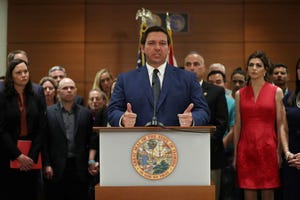GOP debt ceiling bill passes House by narrowest of margins
Legislative Watch: Bill would reduce spending by $4.8 trillion; Office of Environmental Justice; lawmakers seek to bar JBS from government contracting.
April 28, 2023

After late-night negotiations restored biofuels tax credits to Speaker Kevin McCarthy's (R-Calif.) debt ceiling proposal, the package passed the House of Representatives by a thread, 217-215. While the initial draft of the bill would have repealed 25 clean energy tax credits, including several credits for biofuels, an uproar from Midwest lawmakers led to McCarthy restoring three provisions. The final version retained the biomass-based diesel credit, second-generation biofuels credit and the 45Q carbon sequestration credit. It would still repeal credits for sustainable aviation fuel, or SAF, and the new 45Z carbon-reduction credit.
The House bill would also raise the debt ceiling by $1.5 trillion or suspend it to March, 2024, whichever comes first. It would cap discretionary spending at 2022 levels with a 1% yearly growth limit. It would also act to claw back some unspent COVID-19 aid.
The Congressional Budget Office estimated that the bill would reduce spending by $4.8 trillion over the next 10 years were it to become law. However, the Democrat-controlled Senate has no intention of passing the legislation. McCarthy portrayed the bill as his opening salvo in a negotiation and encouraged President Biden to now come to the table and talk with Republicans to find an agreement.
Biden Executive Order creates Office of Environmental Justice
President Joe Biden signed an Executive Order creating the White House Office of Environmental Justice. This office will work within the Executive Office of the President to coordinate matters of environmental justice across all of government. At the signing ceremony, Biden said, "Every federal agency must take into account environmental and health impacts on communities and work to prevent those negative impacts. … Environmental justice will be the mission of the entire government."
Executive Order 14096 states, "We must advance environmental justice for all by implementing and enforcing the Nation's environmental and civil rights laws, preventing pollution, addressing climate change and its effects, and working to clean up legacy pollution that is harming human health and the environment. Advancing environmental justice will require investing in and supporting culturally vibrant, sustainable and resilient communities in which every person has safe, clean and affordable options for housing, energy and transportation. It is also necessary to prioritize building an equitable, inclusive and sustainable economy that offers economic opportunities, workforce training, and high-quality and well-paying jobs, including union jobs, and facilitating an equitable transition of the workforce as part of a clean energy future. …
"Communities with environmental justice concerns face entrenched disparities that are often the legacy of racial discrimination and segregation, redlining, exclusionary zoning, and other discriminatory land use decisions or patterns. These decisions and patterns may include the placement of polluting industries, hazardous waste sites, and landfills in locations that cause cumulative impacts to the public health of communities and the routing of highways and other transportation corridors in ways that divide neighborhoods. These remnants of discrimination persist today."
Lawmakers seek to bar JBS from government contracting
Senator Elizabeth Warren (D-Mass.) and Representative Jamie Rakin (D-Md.) sent a letter to USDA Secretary Tom Vilsack urging him to block Brazilian meatpacker JBS from participating in government contracting based on what they call a "history of criminal conduct." The letter cites over $3.4 billion in fines paid in the past six years by JBS, Pilgrim's Pride, and their parent company, J&F Investimentos, in both the United States and Brazil.
The letter states, "Despite the scale of this figure and J&F's pattern of brazen misconduct, USDA has continued awarding JBS and Pilgrim's Pride government contracts worth over $118 million collectively since their guilty pleas. In 2022 alone, JBS and Pilgrim's Pride contracts were worth $60 million. These contracts continue despite repeated calls to initiate suspension and debarment proceedings against the corporation."
About the Author(s)
You May Also Like





